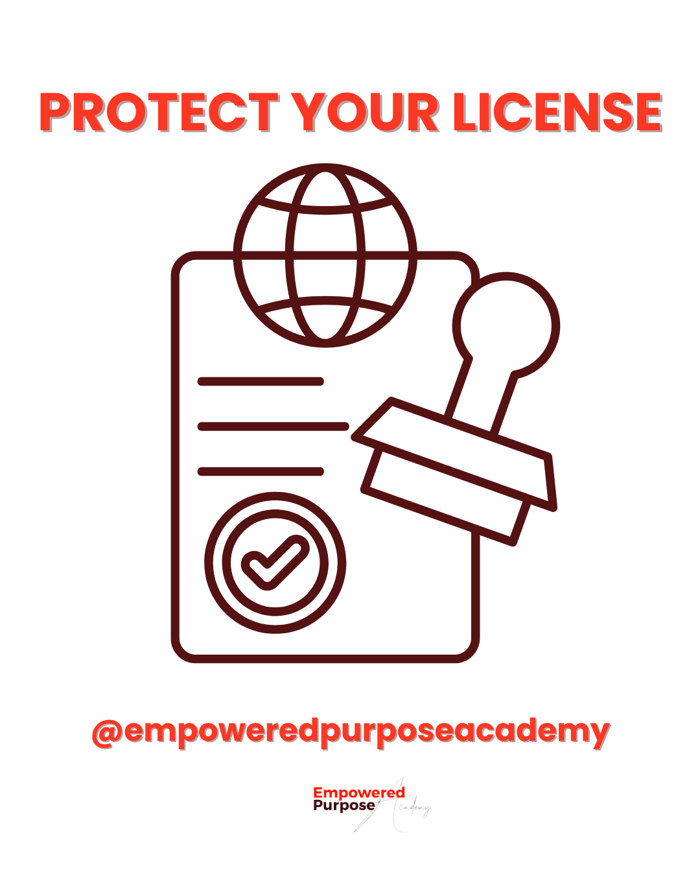Table of Contents
- Protecting Your Therapy License While Providing Coaching
- Understanding the Overlap and the Distinction
- The Core Question: Will I Risk Losing My Therapy License?
- Differentiating Services: How to Keep Coaching and Therapy Separate
- State Licensing Boards and Their Perspective
- Ethical Considerations: When Coaching and Therapy Converge
- Practical Steps to Protect Your License
- Balancing Opportunity and Responsibility
- Final Thoughts: No Need to Choose Between Therapy and Coaching—But Proceed with Caution
- FAQs
Protecting Your Therapy License While Providing Coaching
Protecting Your Therapy License While Providing Coaching
 Protecting Your Therapy License While Coaching
Protecting Your Therapy License While CoachingThis article will explore the legal and ethical distinctions between therapy and coaching, discuss the potential pitfalls, and explain how to safeguard your therapy license while tapping into the growing coaching industry. You’ll walk away with a firm understanding of what you must do to remain compliant with your state licensing board, uphold your professional obligations, and deliver high-quality services—whether you’re functioning as a therapist, a coach, or both.
Understanding the Overlap and the Distinction
A Growing Trend of Therapists Becoming Coaches
Therapists transitioning into coaching are no longer a fringe phenomenon; it’s a thriving trend. Life coaching has ballooned into a multi-billion-dollar global industry, attracting clients who value personal growth, goal attainment, and accountability. As a trained therapist, you already have an edge in many essential coaching skills: empathy, active listening, and a deep understanding of human behavior.
However, this overlap of expertise creates a unique dilemma: how can you keep therapy and coaching separate in the eyes of the law and your licensing board?
Why Clarity Is Key
The primary difference between therapy and coaching is the focus and scope.
- Therapy delves into diagnosis, treatment of mental health issues, and processing of past traumas.
- Coaching emphasizes personal and professional development, future-focused goals, and accountability strategies.
When these lines blur, regulators may question whether you offer therapeutic services across state lines without a license or practice under a non-clinical label while effectively providing therapy. If it appears you’re stepping outside your scope—or failing to abide by ethical guidelines—your license could indeed be at risk.
The Core Question: Will I Risk Losing My Therapy License?
In most cases, simply adding or transitioning to coaching services does not inherently endanger your therapy license. Boards typically focus on whether you comply with ethical and legal standards rather than punishing you for broadening your service offerings. The key considerations boil down to:
Scope of Practice
Are you diagnosing and treating mental health conditions or primarily focusing on goal-setting and personal growth? If your coaching inadvertently slips into a clinical realm—especially across state lines—your board could see that as practicing therapy without proper jurisdiction.Client Confusion
Have you taken care to differentiate between therapy and coaching in your marketing materials, informed consent forms, and actual sessions? If clients believe they’re receiving treatment, you could be crossing professional or legal boundaries if you’re not adhering to the laws governing licensed mental health professionals in that jurisdiction.Ethical Compliance: Are you transparent about your roles, maintain robust record-keeping, and do not engage in clinical work when coaching? You should be safe. However, please feel free to consult an attorney or your state licensing board if you have questions.
Differentiating Services: How to Keep Coaching and Therapy Separate
Clear Branding and Marketing
Your business materials should clearly distinguish between therapy and coaching. Consider having separate web pages, social media accounts, or logos for your coaching services. Terms like “diagnosis,” “treatment,” and “mental health” belong in the therapy realm, not coaching. By contrast, coaching language revolves around goals, personal development, empowerment, and accountability.
Tip: Draft straightforward messaging that says, “Coaching sessions are not a substitute for therapy or mental health treatment. If you need help with depression, anxiety, or other mental health concerns, please consult a licensed mental health professional.”
Informed Consent Documents
Whether acting as a therapist or a coach, you should use distinct informed consent forms for each service. The coaching form should specify the scope of coaching, clarify it is not therapy, and outline confidentiality boundaries. Mention what happens if clinical issues arise—will you refer the client out, or will you offer to transition them to therapy (if they reside in the state where you’re licensed)?
Note: Doing so keeps you above board with regulations and fosters trust and clarity for your clients.
Billing and Insurance
Insurance companies do not typically cover coaching. If you accept insurance for therapy, you must keep those services distinct. Never submit coaching sessions under therapy codes. Maintaining separate business entities, bank accounts, or payment platforms for therapy and coaching can simplify record-keeping and safeguard against any perceived double-dipping.
State Licensing Boards and Their Perspective
Varying Regulations Across States
Licensing boards differ from state to state. Some are more open to practitioners offering adjacent services, while others take a stricter stance on how mental health professionals represent themselves. One universal theme is the expectation that you do not practice therapy outside your state of licensure. If you coach someone in a different location, the board wants reassurance you’re not diagnosing or providing clinical interventions under the guise of coaching.
Action Point:
Research your state’s guidelines on teletherapy, cross-state practice, and complementary services like coaching. If you’re unsure, consider requesting a written advisory opinion.
Complaint Triggers
Even if you’re careful, a disgruntled client or professional rival might file a complaint. Licensing boards typically investigate complaints about:
- Misrepresentation: Portraying coaching as therapy or vice versa.
- Unauthorized Practice: Providing therapy in a jurisdiction where you lack licensure.
- Ethical Breaches: Violating confidentiality or other standards while identifying yourself as a licensed mental health professional.
If you establish well-documented boundaries and protocols, you’ll be in a stronger position to show the board that you acted ethically and within your scope.
Ethical Considerations: When Coaching and Therapy Converge
Assessing Clients for Coaching vs. Therapy Needs
An integral part of starting a coaching relationship is determining if the client’s needs align with the coaching model. If someone presents signs of major depression, PTSD, or other diagnosable disorders requiring clinical intervention, it’s best to refer them for therapy. If you hold the license to treat them, you can offer therapy in a licensed state but keep that relationship separate from any coaching agreement.
Handling Dual Relationships
While you can offer therapy and coaching as two separate services, it’s generally not advisable to do both with the same client simultaneously for the same issues. Combining the two can muddy the boundaries, open you up to legal liability, and confuse the client about their expectations. If you find a scenario where it seems beneficial to pivot from coaching to therapy (or vice versa), close one formal relationship before opening the other with proper documentation and informed consent.
Confidentiality and Record-Keeping
Therapy records are often subject to specific state laws and HIPAA regulations. While coaching is typically not regulated by HIPAA, it should still be handled securely and with a consistent confidentiality policy. Document your sessions in a way that reflects the service you’re providing. Mixing clinical notes with coaching observations could raise questions about whether you were actually doing therapy.
Practical Steps to Protect Your License
Consult a Legal Expert
Legal professionals specializing in healthcare or small business for mental health providers can offer invaluable guidance. They’ll help you draft disclaimers, review contracts, and ensure your marketing language is watertight. This investment upfront can save you significant trouble and expense later.
Check Your Professional Liability Insurance
If you carry malpractice insurance for a therapy license, you can find out if your policy also covers coaching activities. Some insurers treat coaching as a separate domain and require a rider or additional coverage. Being under-insured can leave you vulnerable if a legal issue arises.
Stay Current with Best Practices
Participate in ongoing education through the American Psychological Association (APA), the National Association of Social Workers (NASW), or your equivalent professional body. Many organizations have updated guidance on telehealth, integrated care, and complementary services like coaching. The more you stay informed, the better positioned you are to comply with evolving standards.
Maintain Clear Communication with Clients
Clients should always know which hat they wear: the therapist's or the coach's. When wearing the coaching hat, constantly reaffirm that you’re not providing medical or mental health care. Even small reminders—like disclaimers in email signatures and appointment confirmations—go a long way.
Balancing Opportunity and Responsibility
Embracing the Growth Potential
Coaching offers exciting avenues for expanding your impact. Unlike therapy, you can generally coach people from any location, create group programs, or focus on specialized niches like executive leadership or health and wellness. This variety can be both financially and professionally rewarding. As a therapist-turned-coach, you bring a level of understanding about psychological dynamics that many coaches without clinical training lack.
Upholding Ethical Standards
Because of the potential upsides, you'll need to remain vigilant. Ethical boundaries aren’t just bureaucratic red tape; they’re a framework that protects your client’s best interests and ensures you practice responsibly. Transparent communication, well-defined policies, and consistent adherence to your licensing board’s rules are crucial.
Final Thoughts: No Need to Choose Between Therapy and Coaching—But Proceed with Caution
“Will I risk losing my therapy license if I start coaching?” is a valid concern, but you can confidently mitigate that risk by:
- Delineating the scope of your services.
- Separating your coaching and therapy practices when necessary.
- Keeping impeccable records and informed consent policies.
- Staying up-to-date on legal and ethical standards.
Your background as a licensed therapist equips you with exceptional skills that can flourish in the coaching realm. The critical element is how you frame and deliver your services. Treat coaching as a distinct offering, ensure all promotional materials and client agreements are transparent, and always default to referring a client to therapy if their needs exceed the coaching scope. When done correctly, branching into coaching can be a fulfilling, lucrative way to serve clients in a new capacity—without jeopardizing the therapy license you worked so hard to earn.
By following these guidelines—establishing clear boundaries, remaining transparent, and seeking legal or insurance advice where needed—you can confidently expand into coaching without endangering your professional licensure. Above all, it’s about clarity, compliance, and serving your clients in the most appropriate capacity.
I invite you to download our FREE GUIDE HERE to start a Christian Life Coaching Business.
FAQs
1: Will I risk losing my license if I expand into coaching?
It’s unlikely you’ll lose your license as long as you remain transparent and ethical about your services. Ensure clients understand whether they are receiving therapy or coaching, keep your documentation clear, and follow the guidelines set by your state licensing board.
2: Why is it important to maintain strict boundaries between therapy and coaching?
Boundaries prevent role confusion and legal issues. Separate your marketing materials, keep distinct documentation for therapy vs. coaching, and use clear informed-consent forms for each service. This clarity helps protect your license and ensures clients understand what they’re signing up for.
3: Will my state licensing board punish me just for broadening my scope?
Most boards prioritize compliance with regulations rather than penalizing you for diversifying your practice. As long as you operate within ethical and legal parameters—staying transparent about the nature of your services and adhering to professional guidelines—you’re unlikely to face disciplinary action simply for offering coaching.
4: What should I do if I realize a coaching client needs therapy instead?
If a client’s mental health issues exceed the scope of coaching, refer them to a qualified mental health professional—or switch them to therapy if you’re licensed in their state. Document the change in service and ensure the client fully understands the new arrangement to maintain ethical standards.
5: Do I need legal counsel and special insurance coverage to offer coaching?
Consulting a lawyer is wise to clarify any liability or jurisdictional questions, especially if you coach clients in other states or countries. Make sure your professional liability insurance covers coaching activities, as not all policies automatically extend to non-therapeutic services.






